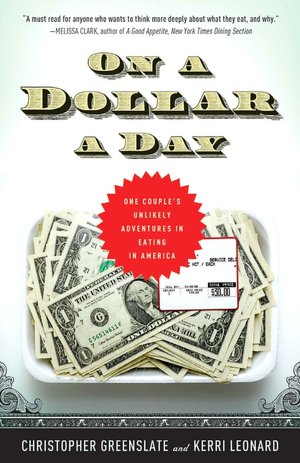*scheduled post*
On a Dollar a Day is a blog turned book by a teacher couple, Christopher Greenslate and Kerri Leonard.
In this book, they detailed three experiments they conducted in the course of their exploration on how to survive using low budgets while incorporating interesting facts from various sources on food costs, e.g. why does processed food have higher markup than fresh foods etc. First they tried surviving on literally a dollar a day, then they tried surviving the National average per-person allowance, which is US$3 in 2007 to understand the struggles of people living on food stamps. Finally they tried to achieve long term healthy and healthful living by supporting local farms and exercising.
The book was an interesting read, and while I applaud their perseverance, I did not agree with Christopher and Kerri's rationale. To me, it would have been more sensible to carry out the most hardcore experiment, i.e. surviving on US$1 during the summer period when they did not have to work. Have they not experienced hunger before? Did they not know that not having sufficient to eat would cause their tempers to fray and cause mood swings and tension? Why did they conduct this experiment during the school year? Even with their best intentions, they would have a negative impact on their students as they could not concentrate on their work, because their thoughts are swayed by hunger and anger. Perhaps they wanted a more accurate assessment on the impact of US$1. Nonetheless I still think it is a bit selfish of them as teachers, and scary how far they were detemined to go until one tablespoon of peanut butter can send their spirits soaring....
The one thing I can say about Christopher and Kerri is that they are lucky they have supportive and patient students and parents. If they pulled this stunt in Singapore, the parents in Singapore would have complained already, instead of being interested and involved in the project. I would say, only in the USA *envious*.
Ultimately the point of the blog and book is bigger than their starving themselves to prove that they could live on US$1 like most of the rest of the world. At the end, they experienced many epiphanies, like how unhealthy living and high food costs is an endless cycle for poverty-stricken people, their own relationships being shaped by hunger and anger and definitely the emotional link a person has with food. This book also makes readers question the way they eat, so I still think it is a pretty good read.
Ultimately the point of the blog and book is bigger than their starving themselves to prove that they could live on US$1 like most of the rest of the world. At the end, they experienced many epiphanies, like how unhealthy living and high food costs is an endless cycle for poverty-stricken people, their own relationships being shaped by hunger and anger and definitely the emotional link a person has with food. This book also makes readers question the way they eat, so I still think it is a pretty good read.


No comments:
Post a Comment